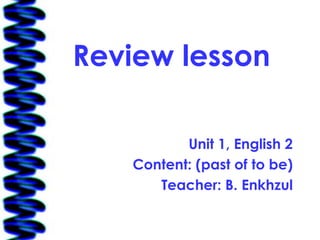
Review lesson
- 1. Review lesson Unit 1, English 2 Content: (past of to be) Teacher: B. Enkhzul
- 2. This is a very famous place in London called Piccadilly Circus. The photo was taken in 1896. Look at the photo and choose the correct option. 2
- 3. Complete gaps There was/ were and wasn’t/ weren’t • _____ hundreds of people. • ______any traffic lights. • ______a double-decker bus. • ______ a flag on top of the building on the left. • ______many horse-drawn carriages. • ______a lot of traffic. • ______any zebra crossings. • ______ a roundabout. • ______some old buildings. • ______a great number of tourists. 3
- 4. 2. Complete with there was or there were. • ___ a bank near my house. • ___ten children in the park. • ___ two kittens in the basket. • ___ a small shop between the bank and the supermarket. • ___many bottles of milk in the fridge. • ___some pencils on the desk. • ___only one book on the table. • ___an old man in the street. • ___ a lot of noise in the classroom. • ___ a huge crocodile in the river. 4
- 5. Can you tell the time? And how would you answer? What time is it? Ask and answer your partner. Draw the time ask your partner. 5
- 6. Draw the time ask your partner. And ask where they were that time. Example: Where were you at 6 o’clock yesterday? Where were you at 12 o’clock yesterday before? Etc 1/15/2013 Free template from www.brainybetty.com 6
- 7. Homework Where were you yesterday? Write time and places 1/15/2013 Free template from www.brainybetty.com 7